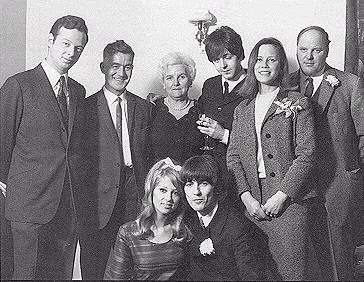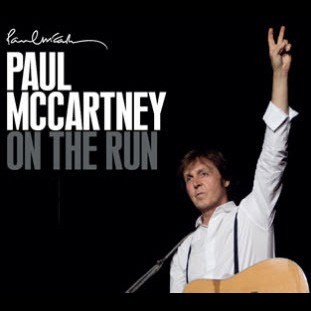Geoffrey Ellis, who worked closely with the Beatles and manager Brian Epstein during the sixties and ended his illustrious career at PRS for Music, has sadly passed away, aged 87.
www.thetimes.co.uk
OBITUARY
Geoffrey Ellis
Lawyer who helped to manage the Beatles’ business affairs despite the fact that he disliked pop music and John Lennon
The Times
March 9 2018

Geoffrey Ellis pictured with Paul McCartney, with whom he formed a friendship
Before the Beatles made their visit across the Atlantic to spearhead the “British invasion”, Brian Epstein, the group’s manager, rang the only person he knew in America for help.
It was not immediately obvious how Geoffrey Ellis, who had known Epstein during their teenage years in Liverpool, could assist in the Beatles’ takeover of the US charts. Ellis was working in New York as an assistant underwriting manager for the Royal Insurance Company and had a strong dislike for pop music.
However, Epstein wanted a familiar face around in shark-infested waters, which was how in February 1964 Ellis came to be hanging out with the Beatles in their suite at the Plaza Hotel overlooking New York’s Central Park as thousands of teenage fans outside screamed, cried and fainted every time one of the Fab Four appeared at the window.
Ellis found Beatlemania unsettling and took an instant dislike to John Lennon. When Epstein asked him to return to Britain to work for his rapidly expanding empire, he protested that he knew nothing about the music business. Epstein told him it did not matter; he needed people he could trust. Nine months later Ellis arrived in London to take up the role of director and chief administrator of Epstein’s NEMS Enterprises. “I was happily settled, doing quite well, modest promotions and so on,” he later recalled. “And I thought to myself, ‘If I had a wife and family, I would turn it down and carry on doing an ordinary job.’ ” Instead, like Epstein, he was a single gay man and unencumbered by such ties. “So I bet my life.”
Epstein had no time or interest in the administrative side of the music industry and Ellis became a key figure in running the business affairs of not only the Beatles but also Gerry and the Pacemakers, Billy J Kramer and the Dakotas, and Cilla Black.
He grappled with problems he had never encountered working in insurance, such as sackfuls of fanmail a day. On more than one occasion he found unopened legal documents addressed to members of the Beatles weeks after they had been sent and which had been mistakenly filed with the love letters and requests for autographs.
He got on well with Paul McCartney and was one of the first to hear Yesterday. When the excited songwriter played him his new composition, Ellis admitted that his ignorance of pop music meant that he had little idea whether it was any good, let alone that it would become the most covered song in history.
He also liked Cynthia Lennon, but found her husband “snide, sarcastic and unfeeling”. He was particularly appalled when he observed Lennon ignoring a group of children in wheelchairs: “They were all very keen to speak to him and get autographs and he just walked past and said, ‘Oh, for Heaven’s sake.’ ”

Brian throws a party at Chapel Street, in honour of George and Pattie. Guests: Paul, Jane, John, Cynthia, Geoffrey Ellis, Wendy Hanson, George Martin, Judy Martin.
By 1967, Epstein’s management contract, giving him 25 per cent of the Beatles’ earnings, was due to expire and he nervously consulted Ellis about whether he should accept less favourable terms of 20 per cent to secure a renewal. The matter never came to the crunch. On August 27, 1967, Ellis and Peter Brown, another NEMS employee, were staying with Epstein at his Sussex home. The three had dinner, but Epstein grew restless, allegedly because some rent boys he had ordered had failed to arrive, and decided to drive back alone to his London home.
Around five o’clock the next afternoon, Epstein called to say he would catch a train back to Sussex. He never did and was found dead the next morning from a lethal cocktail of drink and sleeping pills.
Brown and Ellis, who were in a local pub when the news reached them, made their way back to London and broke the news to the Beatles, who were in north Wales at a retreat with the Maharishi Mahesh Yogi.
The fortune left by Epstein was smaller than expected because he had spent his money extravagantly. His possessions passed to his mother, Queenie, who settled a “generous cheque” on Ellis and invited him to take something as a memento from Epstein’s expensively furnished London home.
Ellis had his eye on a painting by LS Lowry, but Epstein’s brother Clive made it clear that wasn’t on offer and he settled instead for a handsome late-18th century leather-topped desk.
Ellis was born in the Sefton Park area of Liverpool in 1930. His father, Jack Ellis, was a successful estate agent and his mother, Alice, a housewife. Evacuated to north Wales during the war, he was educated at Ellesmere College and in his teens got to know Epstein, who was four years his junior.
After National Service he graduated in law from Keble College, Oxford, but instead of entering the legal profession he joined the Royal Insurance Company at its Liverpool HQ and transferred to the groups’ American division in 1954 when the Beatles were barely out of short trousers.
After Epstein’s death, he remained a director of Northern Songs, which owned Lennon and McCartney’s catalogue, until it was sold acrimoniously to Lew Grade’s ATV.
Northern Songs had been set up by the Beatles’ music publisher Dick James who asked Ellis to join him at his burgeoning DJM group of record and publishing companies. One of James’s signings, Reg Dwight, had just changed his name to Elton John and Ellis assisted in the business affairs of another superstar.
His disciplined, well-organised mind and work ethic once again brought some order into the mercurial world of pop in which he never felt quite at home, given that his natural musical milieu was opera at Glyndebourne or ballet at Sadler’s Wells.
After six years working with John and his manager John Reid, he grew weary of the tantrums and departed with another generous gift, a Bentley.
He later wrote a memoir, which he smartly titled I Should Have Known Better, after the Beatles song. He dedicated the book to Daniel Martin, his partner of 45 years, who survives him.
He spent the rest of his career as a director of the Performing Rights Society.
If he had one regret, it was his failure to persuade English Heritage to erect a blue plaque on the site of Epstein’s former Belgravia home. After initially encouraging noises, the application was rejected and he was told to apply again in another ten years.
There was some compensation in 2014 when the music industry funded a plaque on the site of the former NEMS office where Ellis and Epstein had worked together managing the Beatles.
Geoffrey Ellis, Beatles manager, was born on September 10, 1930. He died after a short illness on February 11, 2018, aged 87


No hay comentarios:
Publicar un comentario